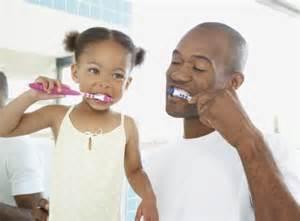The American Academy of Pediatrics identifies tooth decay as the number one dental problem among preschoolers, but it can be prevented. Starting children with good dental habits, from an early age, will help them  grow up with healthy teeth and smiles.
grow up with healthy teeth and smiles.
The American Academy of Pediatrics offers the following information on how to care for your child’s teeth from birth to 24 months of age and beyond.
Tooth decay can develop as soon as the first tooth appears. It’s important to care for your child’s baby teeth because they act as placeholders for adult teeth.
If baby teeth are lost too early, the teeth that are left may move and not leave any room for the adult teeth to come in. And tooth decay in baby teeth can be painful and cause health problems like infections, which can at times be life-threatening. It can also lead to teasing and speech development problems.
- Caring for teeth from birth to 12 months
- Good dental habits need to begin before the first tooth appears.After feedings, gently brush your baby’s gums using water on a baby toothbrush that has soft bristles. Or wipe them with a clean washcloth.
- Ask about fluoride. After the first tooth appears, ask your child’s doctor if your baby is getting enough fluoride. Use a just a smear of fluoride toothpaste (or an amount about the size of a grain of rice).
- Schedule your baby’s well-child visits. During these visits your child’s doctor will check your baby’s mouth.
- Schedule a dental checkup. If your baby is at high risk for tooth decay, your child’s doctor will recommend that your baby see a dentist.
- Caring for teeth from 12 to 24 months
- Brush! Brush your child’s teeth 2 times a day using water on a baby toothbrush that has soft bristles. The best times are after breakfast and before bed.
- Limit juice. Make sure your child doesn’t drink more than 1 small cup of juice each day and only at mealtimes.
- Consult with your child’s dentist or doctor about sucking habits. Sucking too strongly on a pacifier, a thumb, or fingers can affect the shape of the mouth and how the top and bottom teeth line up. This is called your child’s “bite.” Ask your child’s dentist or doctor to help you look for changes in your child’s bite and how to help your child ease out of his sucking habit.
- Schedule a dental checkup. Take your child for a dental checkup if he has not had one.
- Caring for teeth from 24 months
- Brush! Help your child brush her teeth 2 times a day with a child-sized toothbrush that has soft bristles. There are brushes designed to address the different needs of children at all ages, ensuring that you can select a toothbrush that is appropriate for your child. Encourage her to brush her teeth on her own. However, to make sure your child’s teeth are clean, you should brush them again.
- Use fluoride toothpaste. You can start using fluoride toothpaste, which helps prevent cavities. Since the fluoride found in toothpaste is clearly meant to be swished but not swallowed, make sure to help or watch the child while brushing. When she is old enough, tell her to spit out the toothpaste after brushing. Use a pea-sized amount or less and smear the paste into the bristles. Use a smear of fluoride toothpaste on the brush (or an amount about the size of a grain of rice).
- Floss. You can begin flossing your child’s teeth as soon as 2 teeth touch each other. But not all children need their teeth flossed at this age, so check with your dentist first.
- Schedule a dental checkup. Take your child for a dental checkup at least once a year.
Teeth Decay
Parents, especially if they have a history of cavities, can pass germs that cause cavities and gum disease if they share food or drinks with their children. Germs can also be spread when parents lick their children’s spoon, fork, or pacifier. This is why it is important for parents to not share food or drinks with their children.
The following are other ways parents can help prevent tooth decay in their babies and children:
- If you put your child to bed with a bottle, fill it only with water.
- If your child drinks from a bottle or sippy cup, make sure to fill it only with water when it’s not mealtime.
- If your child wants a snack, offer a healthy snack like fruits or vegetables. (To avoid choking, make sure anything you give your child is soft, easy to swallow, and cut into small pieces no larger than one-half inch.) Avoid sweet or sticky snacks like candy, cookies, or Fruit Roll-Ups. There is sugar in foods like crackers and chips too. They should only be eaten at mealtime.
- If your child is thirsty, give him water or milk. If your child drinks milk at bedtime, make sure to clean his teeth afterward. Don’t let your child sip drinks that have sugar and acid, like juices, sports drinks, flavored drinks, lemonade, soda pop, or flavored teas.

